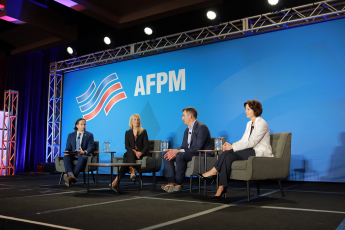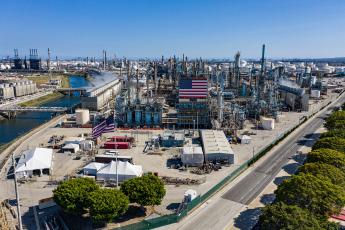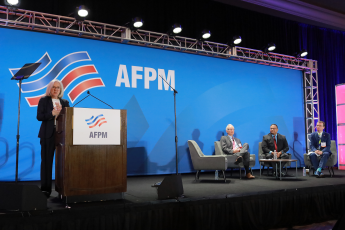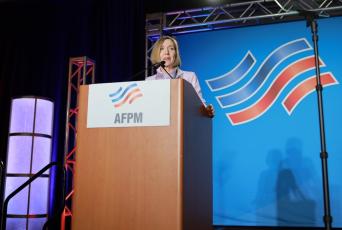AFPM responds to STB’s final rule addressing reciprocal switching
WASHINGTON, D.C. — Today, Rob Benedict, AFPM Vice President of Petrochemicals and Midstream, issued the following statement welcoming the U.S. Surface Transportation Board’s (STB) long-awaited reciprocal switching final rulemaking.
AFPM releases 4th edition Sustainability Report
AFPM released the 4th edition of the Sustainability Report. This report highlights the myriad of examples of the work of AFPM members to deliver on their commitment to sustainably provide the critical fuel and petrochemical products that growing global populations need to thrive.
Highlights from AFPM’s 2024 International Petrochemical Conference
This year’s AFPM International Petrochemical Conference (IPC) showcased the people, policies and trends shaping the future of the global petrochemical industry. Here’s a look at some of the many memorable moments.
Statement on Senate EPA regulatory funding vote
WASHINGTON, D.C. — AFPM President and CEO Chet Thompson today issued the following statement after the United States Senate voted down a measure to defund EPA’s new regulation that will ban most new gas cars in less than a decade.
5 key takeaways from the 2024 AFPM Annual Meeting
Dallas was abuzz recently with more than a thousand refining and petrochemical industry leaders and top names from the worlds of news, politics and global economics convening for AFPM’s 2024 Annual Meeting. With the contentious 2024 election season, massive regulatory onslaught out of Washington, D.C., and the ever-changing and rebalancing global markets all discussed at the event, five key themes stood out.
AFPM expands campaign spotlighting Biden car ban policies to nine states ahead of likely Senate votes
WASHINGTON, D.C. — With the United States Senate expected to vote soon on at least two measures to block or overturn the Environmental Protection Agency’s newly finalized passenger vehicle regulations—policy that will functionally ban most new gas cars and trucks in less than a decade—the American Fuel & Petrochemical Manufacturers (AFPM) is launching a new ad buy today urging Americans in nine battleground states to contact their Senators with an appeal to stop the car ban.
API, AFPM urge Congress to overturn unlawful EV mandate for heavy trucks
WASHINGTON, D.C. — American Fuel & Petrochemical Manufacturers (AFPM) President and CEO Chet Thompson and American Petroleum Institute (API) President and CEO Mike Sommers today issued the following statement on EPA’s newly finalized heavy-duty vehicle standards covering model years 2027 through 2032.
ExxonMobil's Karen McKee named 2024 Petrochemical Heritage Award recipient
WASHINGTON, D.C. – The American Fuel & Petrochemical Manufacturers (AFPM) is pleased to announce ExxonMobil’s Karen McKee—president of ExxonMobil Product Solutions Company—as the 2024 Petrochemical Heritage Award recipient for her outstanding contributions to the petrochemical community. McKee received the award today, March 25 during the International Petrochemical Conference in San Antonio, Texas hosted by AFPM.
Updated: What to know about EPA’s passenger vehicle standards
Reports indicate EPA will be finalizing a major regulation for U.S. passenger vehicles this Wednesday, March 20. Ahead of that announcement, please see a compiled list of frequently asked questions about EPA’s policy and how it aims to force national electric vehicle adoption.









